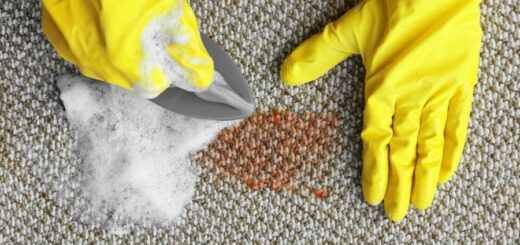How to Clean Ceramic Tile
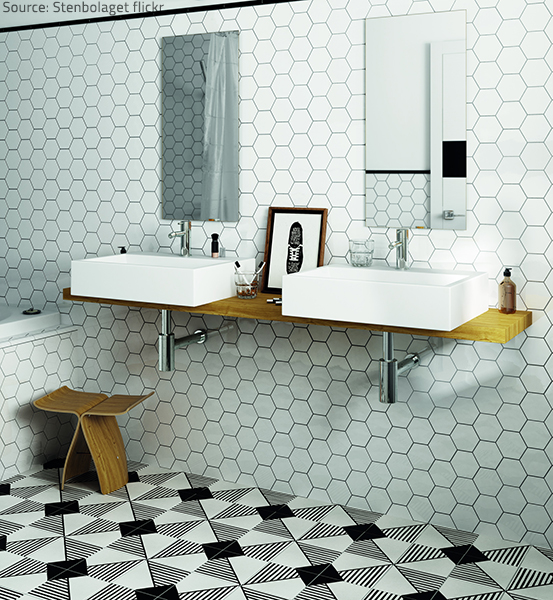
Ceramic tile is extremely versatile and suitable for all kinds of applications.
Elegant, durable, and versatile ceramic tile has been a popular design feature since ancient times. Its sleek appearance, astounding longevity, and ease of maintenanceMaintenance is the routine care, inspection, and repair of a... More make it suitable for all kinds of applications and it adds style and value to the home. Widely used for kitchen, bathroom, and entryway floors, backsplashes, and countertops, ceramic is both functional and aesthetic – the perfect solutionA solution is a homogeneous mixture of two or more substance... More for contemporary homeowners who wish for a clean, modern look and great practicality with as little upkeep as possible.
However durable and easy to maintain ceramic tile may be though, it still requires some proper care in order to stay in sparkling shape for many years of heavy use. So, if you’ve decided on a ceramic floor, counter, or shower enclosure for your home, you need to find an efficient way to clean and protect the tiled surfaces, so that they are in excellent condition at all times.
The following practical guidelines on how to clean ceramic tile will provide you with all the answers you’ve been looking for:
How to Clean Ceramic Tile
Composed of natural clay, sand, and water and fired in a kiln to great density and hardness, ceramic is a tough material that is naturally resistant to stains and general wear-and-tear. However, ceramic surfaces may still become dull or get damaged, if not properly cared for.
- If spills are left unattended for a long time, the tiles can stain and discolor;
- Accumulated dirt and grime can mar the surface and get into the grout;
- Using bleach or ammonia on the tile surfaces can irreversibly stain the grout;
- Scrubbing too hard or using abrasive cleaning products can scratch the tile and cause them to lose their luster, as ceramic tile is typically treated with a glaze that can be easily damaged by harsh cleansers and abrasive tools.
Therefore, you are highly recommended to:
- Clean up any spills immediately after they happen;
- Sweep, dust, mop, and wipe tiled areas on a regular basis and
- Use appropriate ceramic tile cleaners to maintain the good look and feel of the ceramic surfaces in your home.
Good to know: Warm water with a bit of mild detergent is usually enough for daily maintenanceMaintenance is the routine care, inspection, and repair of a... More and common household products such as distilled vinegar and baking soda will allow you to remove tougher stains and keep the luster of the tiles.
How to Clean Ceramic Tile Floors
Contrary to what you may think, the best way to clean ceramic tile is, in fact, quite simple:
- Sweep or vacuum the tile floor to remove loose particles and debris (if any dirt remains on the surface, it can be ground into corners and lodged between tiles when you start mopping the floor). Make sure you use a soft brush broom or the soft head attachment of the vacuum cleaner to prevent scratching the surface. You can also run a dry duster over the floor to fully remove the accumulated dust (otherwise, it will turn to mud when moistened);
- Add half a cup of white vinegar to a gallon of warm water (vinegar is a mild acid that can effectively dissolve grease and water stains, as well as safely deodorize and disinfect tiled surfaces);
- Dip a string or chamois mop (not a spongeA sponge is a porous material used to absorb liquids or clea... More mop, as it will push dirt off tiles and into the grout) in the vinegar solutionA solution is a homogeneous mixture of two or more substance... More, wring it out, and start carefully mopping the floor;
- Replace the cleaning solutionA solution is a homogeneous mixture of two or more substance... More several times as you are working your way across the floor to avoid getting a cloudy film of dirt on the tiles;
- Mop the floor again with clean, hot water and let it air dry.
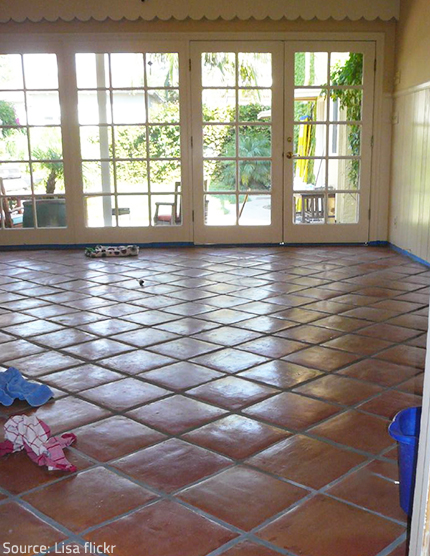
Make sure the ceramic tile surfaces in your home shine with cleanness at all times.
Bonus tip: To keep the tiles sparkling, mop the already cleaned floor with club soda or hot water with some lemon juice in it (both act as a natural polish) and buff the tiles dry with a clean cloth. This will restore the original shine of the ceramic tile and keep it sleek and bright.
Good to know: If you come across stubborn stains while cleaning ceramic tile floors, you can make a paste of baking soda and water and apply it to the spots (or just sprinkle some soda on the surface) and use a soft brush or a cloth to scrub the stains away.
How to Clean Ceramic Tile Shower
Cleaning ceramic tile showers, bathroom countertops, or any other tiled surface that see a lot of dampness presents its own particular challenges:
- MildewMildew is a type of fungus that grows on damp surfaces, typi... More – To prevent mold growth on ceramic tile surfaces, add two teaspoons of tea tree oil to a spray bottle full of warm water and mist it over the tiles;
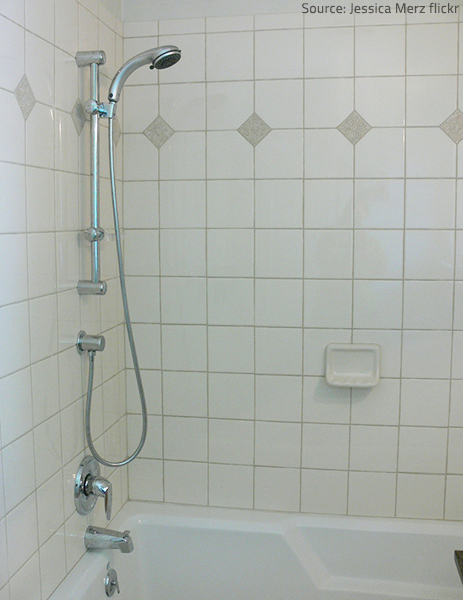
Cleaning ceramic tile showers comes with its own specific challenges.
- Soap residueResidue is any leftover material, such as soot, dust, or che... More – To remove soap residueResidue is any leftover material, such as soot, dust, or che... More or soap scum from ceramic tile, make a paste of baking soda and water and gently scrub the tiles. Also, make sure you rinse the surface thoroughly and dry it well after using soap and/or commercial cleaners to avoid any buildup;
- Water spots – To get rid of water spots on ceramic tile, wipe the surface with a wet spongeA sponge is a porous material used to absorb liquids or clea... More dipped in distilled vinegar (if the results are not satisfactory, scrub the area with baking soda). Rinse with clear water and dry with a soft cloth. Make sure you deal with water spots as soon as you notice them, as they will become more difficult to remove with time.
Good to know: Ceramic tiles in the bathroom, as well as kitchen ceramic tile countertops and backsplashes, should be wiped with an appropriate cleaner (a commercial ceramic tile cleaner or a solutionA solution is a homogeneous mixture of two or more substance... More of baking soda, liquid soap, vinegar, and water) on a daily basis to keep them sanitary and safe for use (daily cleaning will help you get rid of the majority of the dirt and germs and prevent staining).
How to Steam Clean Ceramic Tile
Using a steam cleaner is another viable option when it comes to cleaning ceramic tile. The high-pressure steam cleans and disinfects ceramic tile surfaces better than any other cleaning methods as it can blast dirt out of small cracks and crevices that would be otherwise overlooked.
- Sweep, vacuum, dust, or wipe the tiled surface clean of dust, dirt, and debris;
- Fill the water tank of your steam cleaner with distilled water (do not add any cleaning products to the water!) and attach a microfiber cloth to the steam cleaner head;
- Plug the steam cleaner into a wall outlet and turn it on (some models turn on automatically). The machine will be ready for use within a minute or so (different models may require from 30 seconds to several minutes to heat the water in the tank);
- Pump the handle or squeeze the trigger on your steam cleaner to release the steam through the microfiber cloth;
- Clean ceramic tile floors, walls, or countertops by moving the cleaner’s head back and forth across the surface;
- Replace the microfiber cloth when it gets dirty. Make sure you unplug the unit from the wall outlet whenever you need to change the cloth or the attachment of the steam cleaner;
- Let the ceramic tile air dry (dryingDrying is the process of removing moisture from materials, s... More time after steam cleaning will be much shorter than after cleaning with water).
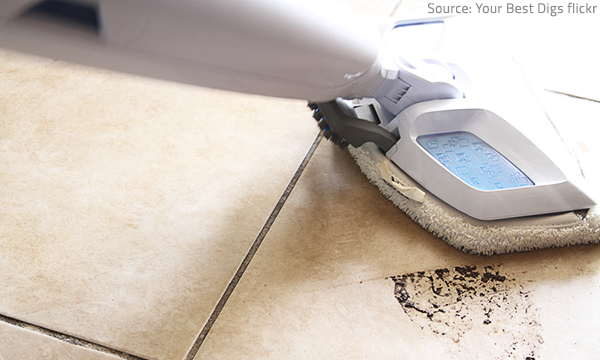
Steam cleaning provides an effective, innovative solutionA solution is a homogeneous mixture of two or more substance... More for keeping ceramic tile in pristine condition.
How to Clean Ceramic Tile Grout
No matter how sleek and shiny your ceramic tiles may be, dirty or moldy grout will make the entire surface look grimy and unkempt. Keeping the grout clean and fresh, however, is quite a challenge.
Grout is used to lock the tiles tight, keep water out, and provide a finished look to the tiled surface. It is, however, a porousPorous describes a material that contains small openings or ... More substance that easily absorbs dirt, dust and grease and harbors bacteria and microorganisms. Therefore, grout is prone to staining, soiling, and moldMold is a type of fungus that grows in damp or humid conditi... More growth.
Sealing the grout will help protect it from discoloration and staining and will allow you to keep the ceramic tile surfaces in your home sanitary and good-looking at all times (resealing will be required every two years).
Scrubbing the grout with a stiff brush (small enough not to scratch the adjacent tiles) and hot water will be enough to keep the grout in good condition, but if it needs deeper cleaning or if you’re dealing with stubborn stains, you’ll have to resort to one of the following options:
- Apply a baking soda paste or a hydrogen peroxide solutionA solution is a homogeneous mixture of two or more substance... More to the stained grout. Let it sit for a while, then scrub with a toothbrush or some other small nylonNylon is a synthetic polymer used in textiles, carpets, and ... More brush, and rinse well;
- Use a commercially prepared grout cleaner and let it sit for about 15 minutes before scrubbing the dirt away and rinsing with clean water;
- Use a quality grout stain that adds permanent color to the grout and creates a seal;
- Steam clean the tiled surface;
- Call professional ceramic tile cleaning specialists to restore the pristine condition of the tiled surfaces in your home.
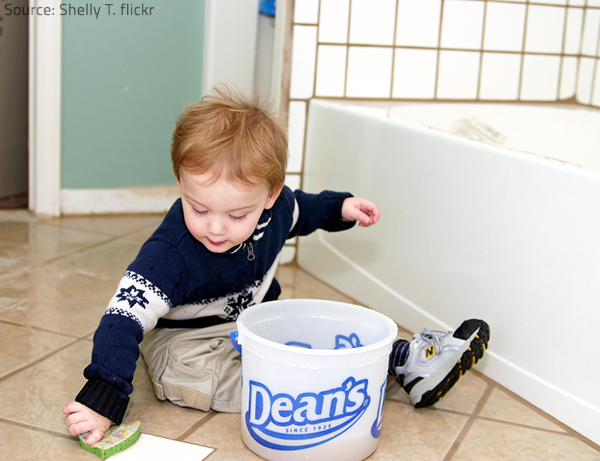
Clean and shiny!
Bonus tip: Once the grout is clean, remember to spray it down with a vinegar-and-water solutionA solution is a homogeneous mixture of two or more substance... More on a regular basis – this will help prevent new stains from setting in.
If you are not sure what cleaning products and methods will be safe to use on your ceramic tile, if you can’t get rid of some particularly stubborn stains, or if you don’t have the time to properly maintain the ceramic tile surfaces in your home (cleaning, resealing, etc.), you can always rely on professional assistance – using expert tile and grout cleaning services will save you a lot of time and effort and will guarantee the excellent condition of your ceramic tile.










